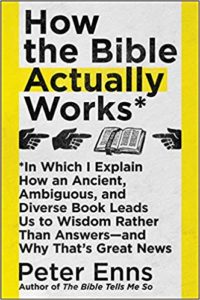Part Two: On Revelation (Part One: On Wisdom), a two-part review Peter Enns’ new book, How the Bible Actually Works
A Bad Reviewer?

The Church HAS Noticed Before
Hello! The Church has noticed the difficulties the Bible presents and has been writing about them for like 1850 years. Enns is not the first to call attention to the sprawling, rambling, and tension filled aspects of the Bible (I know he knows this, but some of his readers might not, and he doesn’t tell them). Augustine hated the Bible at first—exactly because it didn’t make sense, it wasn’t well organized, it wasn’t eloquent or beautiful. The Bible was coarse, confusing, and contradictory. For Augustine the Bible was a disgrace, a blight on landscape of truly great literature. But Augustine eventually saw that his disdain came from his own pride, and that the Bible was composed in such a way to confront and convert our pride into humility, and to move us from immaturity to maturity, from foolishness to wisdom, from self-love to love of God and love of others. So as a pastor and a theologian, I want to say, “Welcome to all you tired and weary, and you who need rest from a disappointing, constrictive, and confusing view of the Bible. Come out of your narrow fundamentalism, not into a loss of faith, but into a wider faith, a broad Church tradition that has honestly grappled with these issues for two millennia.”Not About The Bible, but About God
But, after showing my appreciation for how Enns directs us toward wisdom, at the end of the previous post I noted by concern with his larger project (which comes to a head in the second half of the book). I said, “Enns seems to have turned the Bible into what humans reimagine God to be, and has totally left aside whether the Bible reveals God in anyway.” Not only does Enns invite us into a view of biblical complexity that cultivates wisdom (which is good), but he also invites us into what he repeatedly calls a “sacred responsibility” to reimagine God (update or adapt) for the here and now (which could be good if it wasn’t so one-sided). In his own words, Enns says,“The God I read about in the Bible is not what God is like—in some timeless abstraction, and that’s that—but how God was imagined and then reimagined by ancient people of faith living in real times and places” (124-25, italics in original).
“The sacred responsibility I’ve been talking about is really a call to follow this biblical lead by reimagining God in our time and place” (125, italics in original).
“The Bible does not leave us with one consistent portrait of God, but a collection of ancient and diverse portraits of how the various biblical writers understood God for their times” (153).
“The entire history of the Christian church is defined by moments of reimagining God to speak here and now…Reimagining the God of the Bible is what Christians do” (156, italics in original).One the one hand, I don’t necessarily disagree with these statements. Except that they don’t say enough. Certainly humans have always, in all cultures and traditions, reimagined and adapted what they think and believe about God. But what exactly has God revealed to us (to ask a theologian’s question) and what does it mean for us (to ask a pastor’s question)?
My Childhood was a Lie
Let me illustrate the problem with Enns approach with a story from my childhood.

Just a Library (of wisdom)?
Enns’ view of the Bible—in the end—in not much different than Robotech. Enns’ view is that the Bible is essentially a human collection(s) of different stories (by different authors/editors) that have a common reference to “God”. These “ancient, ambiguous, and diverse” stories, for Enns, represent the collective wisdom of people attempting to “reimagine” God for their here and how. Emphasizing the process of “reimagining God” might sound like a way to save the Bible from fundamentalism, to loosen the strangle hold of literalism and absolutism, and to appreciate the diversity within the Bible. And those are good things. But without a doctrine of scripture/revelation (a theologian’s question) we haven’t really saved our connection with God (a pastor’s question). The producers of Robotech “reimagined” three unrelated Japanese anime television series to make them consumable “here and now” for an American audience. It seems hard to understand how seeing the Bible as a similar “reimagining of God’s story” is any less of a lie in the big picture. At most the Bible is a library of somewhat successful and sometimes failed attempts at adapting God to the realities the here and now of the author. Enns seems to save the Bible while losing God (says the pastor and theologian).Staking a Claim, not Reimagining One
But while written and composed by humans, the Bible drives some stakes in the ground beyond the here and now of culturally engaged, wisdom informed, reimaginings. Let’s look briefly at John 1 and Hebrews 1.“In the beginning was the Word…and the Word became flesh and dwelt among us.” (John 1:1, 14)The author of John certainly is reimagining the beginning of Genesis 1:1 and applying it to Jesus, who is the Word of God—the Word with God from the beginning. And the author is appropriating tabernacle imagery (the very place of God’s presence) and applying it to Jesus. Certainly these claims are made in history (the here and now of a contingently cultural moment). But they are claims that transcend history, that put Jesus in a different relationship to history and culture. They can’t easily be swept aside as “And that is just how John reimagined God to be.”
“In the past God spoke to our ancestors through the prophets at many times and in various ways, 2 but in these last days he has spoken to us by his Son, whom he appointed heir of all things, and through whom also he made the universe. 3 The Son is the radiance of God’s glory and the exact representation of his being, sustaining all things by his powerful word.” (Hebrews 1: 1-3a)The author of Hebrews claims that God spoke—not just humans reimagining things about God. But God spoke—in various ways, through people. But now God has spoken by his Son—who has more authority than the prophets because he is both the creator and inheritor of all things. Not only this, but in his speaking (his powerful word) the Son radiates God’s glory and represents God very being. Again, these claims are made in and about history, and are wise appropriations of previous elements from the Bible. But they also make trans-historical claims about Jesus, claims that transcend a merely human process of re-imagining God. These passages claim that God came down and did, said, and revealed something. And our “sacred responsibility” isn’t just to continue the reimagining process, but to faithfully witness to these realities as if they are true for the whole world, all of reality.















